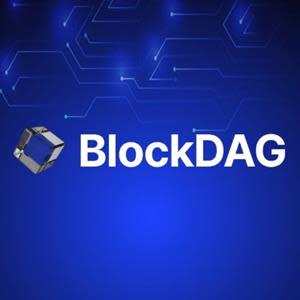
London, UK, March 28, 2024 (GLOBE NEWSWIRE) — Cryptocurrency mining has long faced scrutiny for its excessive energy consumption and subsequent environmental impact. In 2022, The White House discovered that crypto assets accounted for 0.4% to 0.9% of the total annual global electricity consumption, exceeding the energy usage of some individual countries.
However, a recent study published in the journal PNAS has proposed a partnership between cryptocurrency mining and green hydrogen production, offering a potential avenue for accelerating the transition to cleaner energy while promoting broader adoption. In this article, we delve into the dynamics of Bitcoin and Ethereum mining, introduce BlockDAG Network mining, and explore how these projects’ approach could contribute to democratizing the industry while supporting renewable energy initiatives.


The study featured in PNAS underscores the synergistic potential between cryptocurrency mining and green hydrogen production, envisioning a scenario where profits from mining activities could be reinvested into clean hydrogen production and renewable energy businesses. This innovative solution involves utilizing crypto profits to drive the expansion of solar and wind energy indirectly through green hydrogen production.
Bitcoin:
Bitcoin, operating on a Proof-of-Work (PoW) consensus mechanism, traditionally relied on energy-intensive mining operations powered predominantly by fossil fuels. However, the PNAS study offers an optimistic outlook on Bitcoin’s potential role in renewable energy expansion. It suggests a shift towards clean energy sources for Bitcoin mining, with energy companies or climate-focused groups undertaking mining activities instead of conventional individual miners. This shift aims to democratize the space, and ensures that earnings from mining are directed towards sustainable energy projects.


BlockDAG Network:
BlockDAG Network presents a distinct departure from traditional blockchain consensus methods, offering a novel approach to transaction processing. Unlike linear blockchains like Bitcoin, which arrange transactions in sequential blocks, BlockDAG employs a graph-like structure, facilitated by Directed Acyclic Graphs (DAGs), enabling parallel processing and enhanced scalability. With the introduction of its mining solution, BlockDAG Network seeks to usher in a new era of accessibility and democratization within the passive income generation industry.
By harnessing the unique attributes of DAGs, BlockDAG Network pioneers a system where mining is no longer confined to large-scale operations that are not energy-efficient but instead, users can seamlessly integrate the machines into everyday households. Unlike conventional blockchain networks relying on Proof of Work (PoW) mechanisms and intensive computational power, BlockDAG eliminates the need for expensive, specialized mining hardware. Instead, it adopts a more inclusive approach, allowing individuals to participate in the mining process using affordable mining rigs available for purchase on the website, priced at $1,500 or less. This accessibility empowers anyone with a computer or smartphone connected to the internet to initiate mining activities promptly thereby generating passive income.
Through its innovative home mining solutions, BlockDAG Network democratizes access to the cryptocurrency ecosystem and enables individuals worldwide to actively engage in block creation and validation while reshaping the landscape of digital currencies for the financial benefit of all.


Ethereum:
Ethereum formerly operated on the same unsustainable proof-of-work (PoW) mechanism as Bitcoin. However, on September 15, 2022, Ethereum underwent a transition, replacing its PoW mechanism with an alternative known as proof-of-stake (PoS). The transition of Ethereum from proof-of-work to proof-of-stake is known as the “Merge” and promised a drastic reduction in electricity consumption. Vitalik Buterin, Ethereum’s co-founder, projected that the transition to PoS would decrease global electricity usage by 0.2% and slash crypto carbon emissions by 99.992%. The Crypto Carbon Rating Institution reported a staggering 99.99% reduction in Ethereum’s energy consumption and carbon footprint immediately after the Merge.
This change eliminated the network of energy-intensive mining devices that previously competed to create the next block for the underlying blockchain. Instead, wealth became a pivotal factor in the block creation process under PoS. Coins are staked as collateral, with the software randomly selecting a stakeholder to create the next block. Unlike PoW, where the chance of obtaining a reward depended on employing more energy-intensive devices, PoS incentivizes acquiring a higher stake to increase the odds of creating a new block.
Now, Ethereum’s PoS represents a significant improvement over PoW in terms of electricity consumption.


While decentralization is crucial for blockchains to function effectively, it often comes with environmental costs. This appears to be about to change as Bitcoin and Ethereum mining together with BlockDAG Network mining hold the potential to drive a more sustainable and democratic future within the cryptocurrency industry. By embracing innovation, inclusion, and sustainability, these projects can pave the way for a greener, more resilient digital future.
Read About BlockDAG Presale:
Website: https://blockdag.network
Presale: https://purchase.blockdag.network
Telegram:https://t.me/blockDAGnetworkOfficial
Discord: https://discord.gg/Q7BxghMVyu
Disclaimer: The information provided in this press release is not a solicitation for investment, nor is it intended as investment advice, financial advice, or trading advice. It is strongly recommended you practice due diligence, including consultation with a professional financial advisor, before investing in or trading cryptocurrency and securities.
CONTACT: Brown Williams support at blockdag.network















